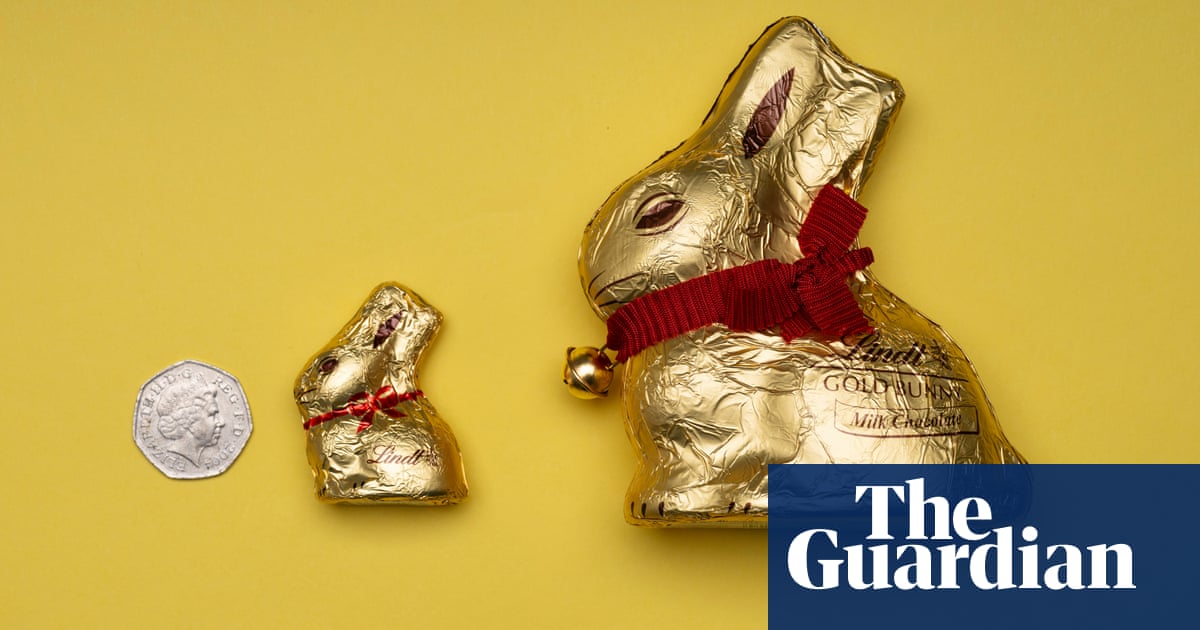This is a little bunny that can significantly reduce your Easter budget. Cost-conscious chocoholics may want to stay away from Lindt's smallest golden bunny after a Guardian investigation found that in pound terms it appears to be the most expensive Easter treat on supermarket shelves.
The Lindt Gold Bunny mini milk chocolate weighs just 10g – so light that Guardian didn't register at the self-service checkout while shopping. But price-wise it's a heavyweight: we haven't found any Easter chocolate on sale at a higher price per 100g in major supermarkets.
In Waitrose, buying a single 10g bunny will cost 75p – the equivalent of £7.50 per 100g.
This makes the tiny treat more than twice the price per gram of its 100g cousin, which the retailer has currently reduced by 60p to £3.15, and the 100g Lidl Excellence dark chocolate bar selling for £2.75.
You get more bang for your buck – or more for your cake – with Waitrose's offer of two 10g rabbits for 90p, but even then the cost per gram is higher than most other Easter gifts on sale.
At Asda, where a bijou bunny is 60p and two are £1 (£6 or £5 per 100g), customers are selling quickly. Comments on the store's website read: “Absolutely tiny, blink and you'll miss it” and “Avoid. They look quite large in the photo and should resemble a miniature. Because then they are the size of 10p.
At Sainsbury's, 70p without a Nectar card – or 60p with a card – it's also the most expensive way to buy Easter chocolate.
While small treats will always cost more than larger eggs due to the relative costs of packaging and shipping, the little bunny still stands out. The Maltesers Chocolate Bunny is almost three times as heavy, weighing 29g, and costs 55p in Waitrose, which is the equivalent of £1.90 per 100g.
The goofy-faced Smarties bunny weighs just 18.5g, but at 65p it costs £3.52 per 100g, less than half the price of Lindt.
The golden bunny is fiercely protected by its manufacturer. Two years ago, Lindt competed with Lidl and won, forcing the budget supermarket to melt down its imitators. The chocolatier produces a variety of sizes, including a deluxe one-kilogram version that costs £65.
A Waitrose spokesman said: “We work extremely hard to keep prices as low as possible, while also paying our suppliers fairly. We have a wide range of Easter products to suit every budget and we run regular promotions. For example, this Lindt mini bunny is now available at 'two for 90p', which provides much better value per bunny than in other supermarkets.”
A Lindt spokesman said the challenge was rising ingredient costs. “This is particularly true of our most important commodity, cocoa, which has almost doubled in price over the past year to a new all-time high on the London Commodity Futures Exchange.”
The main factors driving cocoa prices up are abnormal weather in West Africa and a disease called “swollen shoots”, which attacks trees and reduces farmers' yields.
A spokesman said Lindt “has made concerted efforts to offset these increased costs through increased production efficiency, cost savings and a forward-looking purchasing strategy.” Given the scale of the increase in raw material costs, we had to increase prices also for our customers and in our direct business.”
Unlike other Easter treats, the bunny has not fallen victim to shrinkage inflation, which involves reducing the size of a product to avoid or mask price increases. However, the Guardian found several examples of gifts that have declined since last year's celebrations as manufacturers try to keep costs low. The largest cuts are made to the largest eggs.
Among the examples we found is the Cadbury's Dairy Milk Ultimate Fruit & Nut Easter egg, which weighed a whopping 532g last year, but this Easter weighs in at a more modest 400g – a reduction of almost 25% while the price remains at £12 .
And the amazing KitKat Caramel Cookie Collision Chocolate Easter Egg – last year's version it weighed 556.3 g, while this year's is 512.7 g.
A spokesman for Nestlé, the maker of KitKat, said: “Each year we introduce a new Easter range of formats, sizes, weights and retail prices based on a range of factors including production costs, ingredients and transport, and the preferences of our customers and consumers. Final prices are at the discretion of individual retailers.”
Mondelez International, the owner of Cadbury, said changing product sizes was a last resort for the company. The high costs of ingredients, production and transportation mean that products are more expensive to produce.
A spokesman said: “While we have covered these costs where possible, we still face significant challenges.
“As a result of these difficult conditions, we have had to make the decision to slightly reduce the weight of a small selection of our Easter products so that we can continue to provide consumers with the brands they love without compromising the great taste and quality they expect.”
